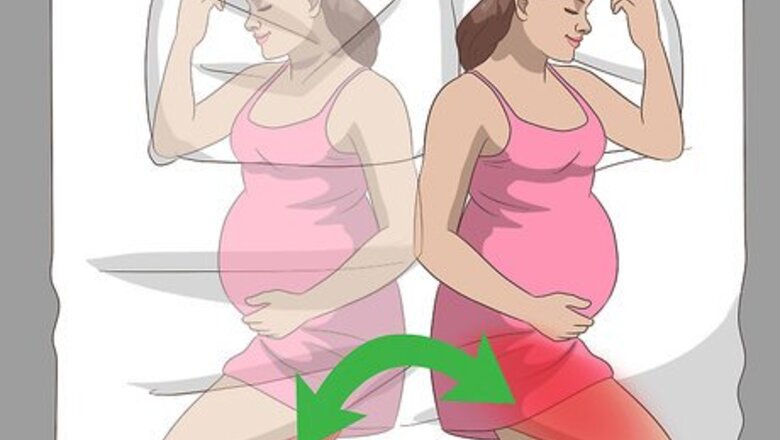
views
Relieving Pressure on the Sciatic Nerve
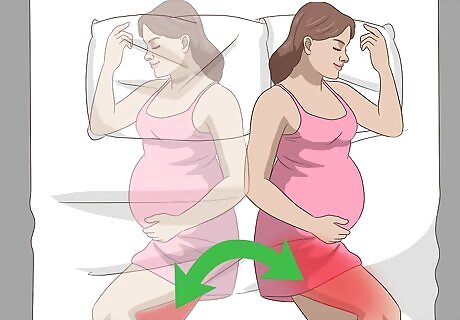
Lie on your side, opposite of the pain. If you feel pain on the right side of your body, try lying down on the left side, or vice versa. Sometimes the discomfort experienced on one side will disappear if no additional pressure is applied to the area. Resting your body this way will also remove pressure from your joints and muscles. If possible, do this whenever you experience severe sciatic pain. Purchase a pregnancy wedge pillow to place behind your back while you sleep if you tend to toss and turn at night.
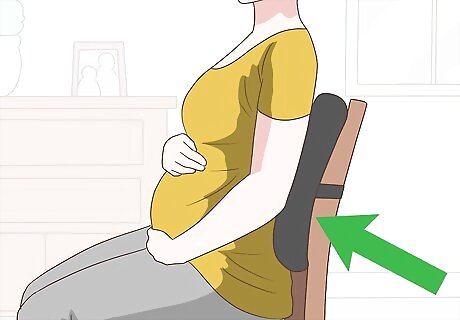
Support your spine with a small cushion when sitting. Place a small lumbar cushion behind your lower back when sitting down. The cushion may help to ease your sciatic pain by supporting your spine and reducing pressure on the sciatic nerve. It will also ensure that you sit up straight, which will help reduce back pain. If you don't have a lumbar cushion, place a rolled up towel behind your lower back for the same effect.
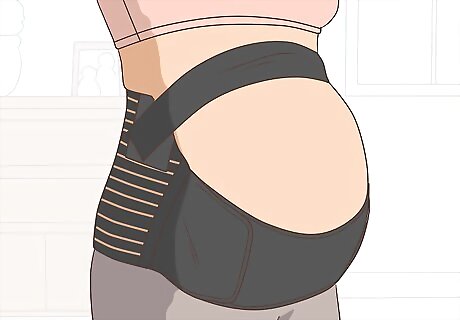
Purchase a pregnancy support belt to relieve the strain on your back. Your doctor may recommend that you wear a pregnancy support belt, which fits under your stomach and around your back to disperse the extra weight you are carrying. These garments come in different sizes, shapes, materials, and fits. Ask your doctor to recommend a type of support belt. You may need to adjust the belt or buy a larger size as your pregnancy progresses. Most pregnancy belts are made of cotton or nylon, and fasten with hooks or velcro. For a wide selection of pregnancy support belts, browse online medical supply stores.
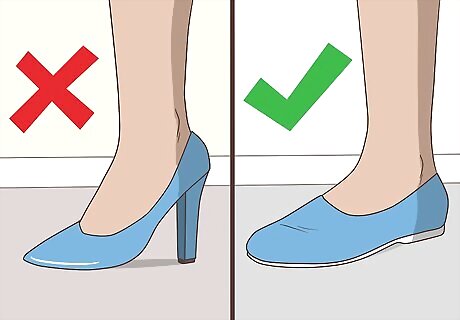
Wear shoes with a low or flat heel. If you are suffering from sciatica, avoid shoes with high heels, which direct your body weight backwards. This kind of pressure places tension on your lower back, aggravating the sciatic nerve. Wear flat shoes or shoes with small, low heels to keep your weight centered. If you have flat feet or back problems, you may actually need to wear a small heel instead. Consult a podiatrist for more advice.
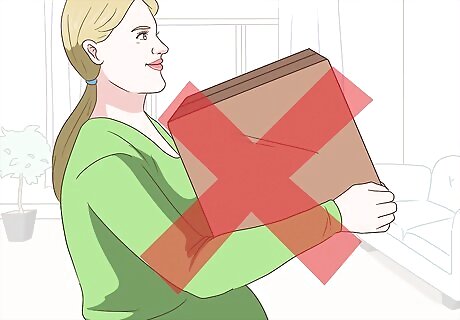
Avoid lifting heavy objects. If possible, avoid lifting any kind of heavy objects while you are pregnant. Strenuous lifting can put pressure on the sciatic nerve. If you have to lift heavy objects, make sure to keep your back straight and bend and lift with your knees. Ask others for help moving large items or carrying heavy bags, especially in the last trimester. As a general rule, avoid lifting anything over 25 pounds while you are pregnant.
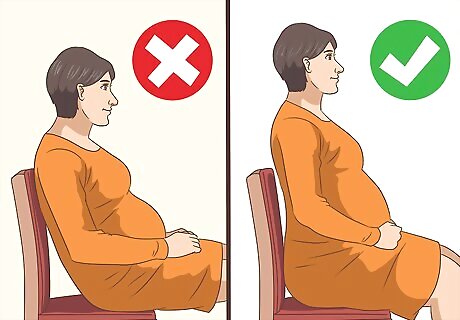
Maintain good posture. Slouching or slumping over can put undue pressure on your lower back, aggravating your sciatic nerve. Maintain good posture when sitting and standing and balance your body weight evenly. When sitting, aim to arch your back slightly to keep your body upright. Always keep your head straight and shoulders back.
Easing Moderate Sciatica Pain
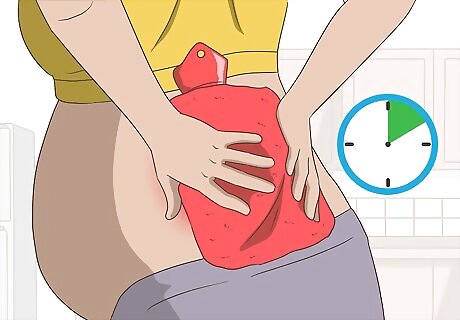
Apply a warm heating pad to the painful area for 10 minutes. Use an electric or reheatable heating pad to ease the discomfort of sciatica. Place the pad over the painful area and leave it there for 10 minutes. To prevent burning or irritation, avoid touching the heating pad directly to your skin. Make sure that the heating pad is warm, but not hot. You can purchase a heating pad or make your own. Avoid using a heating pad for more than 10 minutes per hour.

Take a warm shower or bath. A warm shower or bath will help to ease aches and pains temporarily, including sciatica. Aim for water that is moderately warm, but not hot. Your body temperature should not be raised more than 102.2 degrees Fahrenheit (approximately 39 degrees Celsius) for more than 10 minutes. If the water is too hot, you may feel dizzy or weak. In this case, stop the bath or shower.
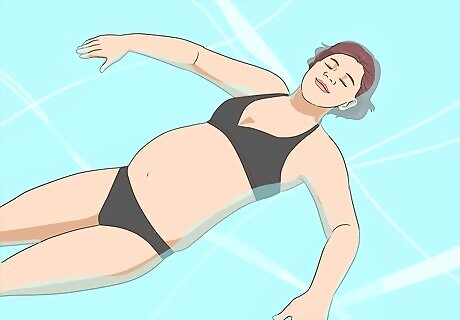
Swim to relieve your sciatica pain. When submerged in water, the body experiences a feeling of weightlessness, which can reduce the pressure placed on your sciatic nerve. Swim leisurely for 30-60 minutes at a time to relax your body. Avoid rigorous swimming, which may exhaust or strain your muscles. Stop swimming if you experience dizziness or weakness.
Getting Help for the Pain

Ask your doctor about taking acetaminophen for the pain. If your sciatica pain is severe, consult your doctor to see if it is all right for you to take an over-the-counter medication. Your doctor will likely prescribe acetaminophen in a dose that is just high enough to take the edge off the pain. To ensure that you and your baby are safe, do not exceed the dose recommended by your doctor. If you're using over the counter medication, use a half dose first to see if that helps. This is usually 325 mg. If that doesn't help, take a full dose (650 mg) after 4 hours.
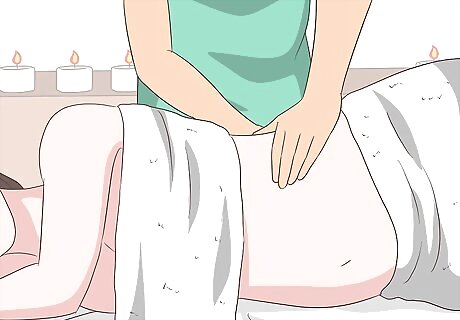
Get a prenatal massage from a licensed massage therapist. Massage therapy can ease sciatica pain by treating the area around the sciatic nerve to relieve pressure. Look for a licensed massage therapist with experience in prenatal massage. Make sure that your massage therapist owns a special pregnancy massage table. To find a licensed massage therapist within the United States, visit the American Massage Therapy Assocation's website at https://www.amtamassage.org/findamassage/index.html.
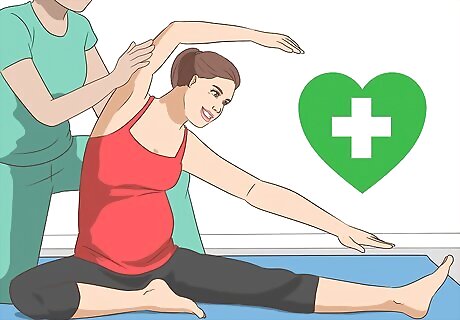
Go to physical therapy to learn beneficial stretches and exercises. Ask your doctor if physical therapy is a viable option for you during your pregnancy. They may give you a referral for an evaluation with a physical therapist or chiropractor. In therapy, you will learn stretching and strengthening exercises that will help ease pressure on your sciatic nerve. Your doctor may not recommend physical therapy if you have a high-risk pregnancy.
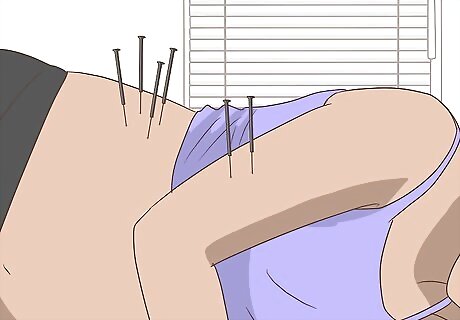
Get acupuncture treatments to minimize your pain. Acupuncture is a minimally invasive, risk-free therapy that can reduce many kinds of pain. It can help ease sciatic pain by increasing endorphins that make you more resistant to pain, and by reducing inflammation that may be contributing to pressure on your sciatic nerve. Look for a licensed acupuncturist and ask if they have any experience with patients who are pregnant. You should check with your doctor before booking an appointment to make sure that acupuncture is a good option for you. If you are looking for an acupuncturist in the United States, make sure they have the professional initials D.A.B.M.A. These initials signify that they've been certified by the American Board of Medical Acupuncture. Acupuncture can also treat pregnancy issues like morning sickness, depression, and sleep problems.




















Comments
0 comment